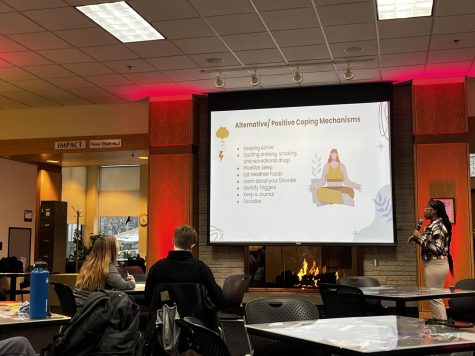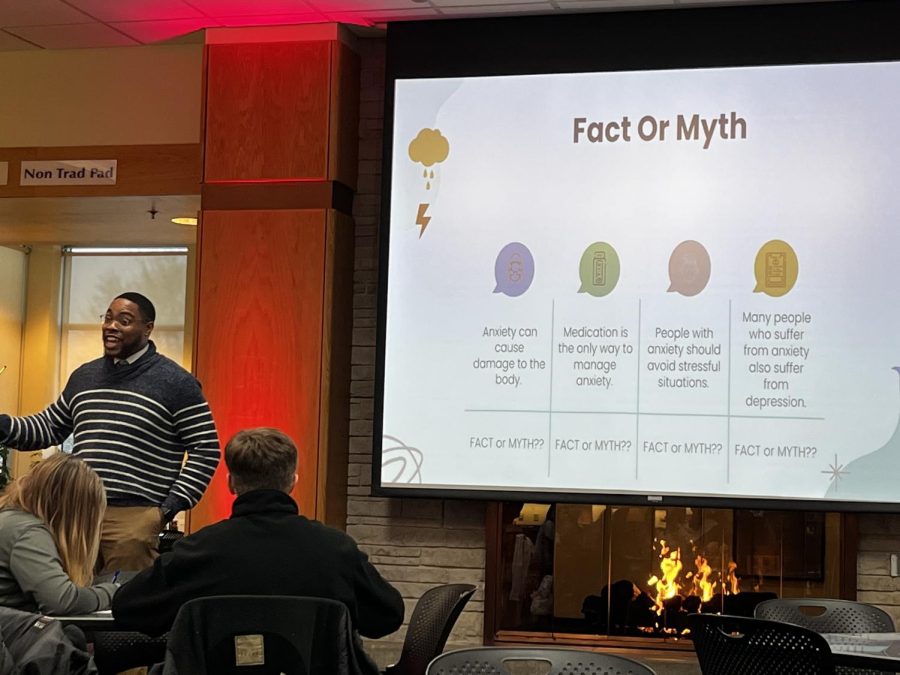Taking care of our mental health
Aaron Broadwater, program specialist, explaining the game of ‘fact or myth’ with anxiety as a way to keep the students engaged.
February 20, 2023
The Warhawk Connection Center and Ambrose Health Center came together Feb. 14 to provide a presentation to teach students and staff about handling anxiety.
Attendees enjoyed a welcoming environment of quiet music, a warm fire and smiling staff.
The presentation featured Dr. Veronica Warren of University Health and Counseling Services as a mental health representative, Warhawk Connection Center program specialist Aaron Broadwater and intern Kaylynn Brown.
Anxiety as a whole is something that many college students deal with, and the issue is present on campus. The presentation helped students to understand their anxiety and how to deal with the symptoms. Students should be taking their mental health seriously, as this is a new year and a year of not only physical health but also mental health.
“The main reason for this presentation is to bring awareness to the reality of diagnosed anxiety and how it affects people in their daily life,” said Brown.

They describe anxiety as “a disorder that can be best described as a condition in which a person has excessive worry and feelings of fear, dread, and uneasiness,” as it affects many people and can look different. This sense of worry affects not only their academic performance, but also their personal affairs.
In a game of fact or myth about anxiety, there was a question that asked if anxiety could cause damage to the body. The answer, surprisingly fact, is that people that have anxiety tend to be more physically tired. Brown explains that the changes that are shown in people tend to range from mood problems to physical problems, and this is because they tend to get caught up in the cycle of being stressed, then leading to them not knowing who to reach for, being belittled, and isolating. This is what ultimately leads to depression.
“Depression is a common and serious medical illness that affects how you feel, the way you think, and how you act,” said Broadwater.
Depression can come from any source, but an important one to note is that if anxiety goes untreated, it can lead to depression, which is also linked to panic attacks/anxiety attacks.
During this presentation, Broadwater explains the difference between anxiety and panic attacks using an infographic, describing an anxiety attack as having a trigger, while panic attacks are coming out of nowhere. This is something that is important to know as students and faculty because the treatment options are different. This as a whole is important to our mental health because if it is an anxiety attack, one should be able to find the root cause, and increase and change habits. While with a panic attack, students should be worrying about keeping the person comfortable.
Broadwater also explains that anxiety and depression shouldn’t be something to be ashamed of, it affects a lot of Americans, and is heavily found in college aged students.
“Embrace all emotions because they are all normal and need to be felt,” said Warren.
Dealing with our emotions is something that makes us human, and if we don’t feel them, then we will bottle them up and lead to more mental health problems, causing our mental health to deteriorate. With anxiety and depression, it is easy to self isolate and continue to be in the vicious cycle of not knowing what to do. Warren explains that this is common among students in college and students that are graduating, which is why it’s important to know about your own mental health.
Something that was covered in this by Warren hones in on ‘self diagnosing,’ basically meaning to think within ourselves and make sure we, as a whole, are doing okay. Some common symptoms of anxiety and depression are sleeping problems, whether that be too much or too little sleep, physical aches, from tensing up so much, and memory difficulties, because one cannot focus on ‘in the moment’ when stressed. Being able to look within yourself to see if you have any of these symptoms is important because you know yourself best. One of the main symptoms is feeling ‘foggy brained’ which is something that can be written off as tired, but knowing the difference between feeling anxiety and being tired is important. The main point that Dr. Warren was trying to make was that everyone is different but being able to look inside yourself to see if you are feeling ‘off’ may be the first step in getting help for anxiety. And she wants everyone to know that it is okay to not be okay, especially during this transition period, as it is very stressful.
As for treatment of these, some include anti-depressants/anti-anxiety medicine, but the best way to keep up with our mental health is to see a therapist, and to continue to work hard on ourselves. Another thing that can help is to relax with tea, a book, or simply taking deep breaths. There are many remedies for anxiety located on their website, www.uww.edu/uhcs, for more information on localizing anxiety.
There are many resources on campus that are available to students through UHCS that are free to students; and if you or anyone you know need help, please reach out to either the suicide hotline (988) or the campus mental health services.















Kathy Craney • Feb 22, 2023 at 1:57 am
Thank you for this excellent information!